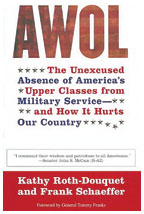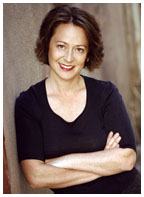September 27, 2006: Books and Arts
Kathy Roth-Douquet *91 argues that U.S. opinion-makers are dangerously estranged from the armed forces. (Harpercollins) |
Reading Room
Who
serves and who doesn’t
Kathy Roth-Douquet *91 explores the absence of the upper class
in the U.S. military
By Kathleen Kearns
Kathy Roth-Douquet *91 isn’t your typical Marine wife. Raised in an upper-middle-class community in Shaker Heights, Ohio, twice arrested for political protest, a self-described feminist, Ivy Leaguer, and longtime activist in the Democratic Party, she didn’t know any members of the military until she enrolled in the Woodrow Wilson School, where she earned a master’s degree alongside students serving in the armed forces. “Not knowing who they were, what their values were, it was a real foreign encounter for me,” she recalls.
It wasn’t until she had worked in the Clinton White House and the Department of Defense and married a career Marine officer that Roth-Douquet began to understand why men and women make a commitment to serve, regardless of their politics, and she developed a deep appreciation for the role of the armed forces. In AWOL: The Unexcused Absence of America’s Upper Classes from Military Service —And How It Hurts Our Country, published in May by Collins, she explores the disconnect between people from America’s upper classes and the military world, and she argues that the military and the country’s opinion-makers are dangerously estranged.
 Her
co-author, Frank Schaeffer, is a novelist who revised his own “bohemian”
views of the military after his son joined the Marines. In AWOL,
each chapter begins with brief sections written separately by the co-authors;
the rest of the chapter is written in one voice.
Her
co-author, Frank Schaeffer, is a novelist who revised his own “bohemian”
views of the military after his son joined the Marines. In AWOL,
each chapter begins with brief sections written separately by the co-authors;
the rest of the chapter is written in one voice.
Before Vietnam-era upheavals and the elimination of the draft, the authors argue, the country’s industrial, political, and media leaders had more personal experience with the military. “About half of the [members of the] graduating classes of Princeton and Harvard entered the service for a tour of duty in the ’50s,” they write. “Today, less than 1 percent do.” They quote Princeton alumni who recently bucked that tide. One says, “Whenever I tell someone that I’ll be ... going into the Marine Corps, a typical response is, ‘Oh, why are you doing that?’” Most military recruits come from working-class families and those making just below median income, says Roth-Douquet.
Roth-Douquet and Schaeffer believe that because of the elite’s unfamiliarity with military service, policy-makers make poorly informed decisions, academics and journalists dispense poorly informed opinions, and emerging leaders miss opportunities to build self-confidence and take on responsibility. In AWOL, the two authors differ on some key points — Schaeffer wants to reinstate the draft to eliminate the class disparity, while Roth-Douquet would like to see the military and public figures convince young people to serve.
Roth-Douquet recognizes that those who assume that members of the military
are underprivileged, over-avid gun collectors often come from a background
like her own. As offended as she sometimes gets when people disparage
the military, she says, “I have to remember these are things I would
have said myself at a different period of my life.” ![]()
Kathleen Kearns is a freelance writer in Chapel Hill, N.C.
Book Shorts
 Hollywood Jock: 365 Days, Four Screenplays, Three TV Pitches, Two Kids,
and One Wife Who’s Ready to Pull the Plug — Rob Ryder
’72 (Harper). A technical consultant on sports-themed films and
a wannabe screenwriter, Ryder has never seen one of his movies produced.
Based on a collection of his humorous “Hollywood Jock” columns
for ESPN.com, this memoir recounts a year he focused on landing a deal
as he tweaked his scripts, schmoozed with Hollywood producers, and dealt
with rejection.
Hollywood Jock: 365 Days, Four Screenplays, Three TV Pitches, Two Kids,
and One Wife Who’s Ready to Pull the Plug — Rob Ryder
’72 (Harper). A technical consultant on sports-themed films and
a wannabe screenwriter, Ryder has never seen one of his movies produced.
Based on a collection of his humorous “Hollywood Jock” columns
for ESPN.com, this memoir recounts a year he focused on landing a deal
as he tweaked his scripts, schmoozed with Hollywood producers, and dealt
with rejection.
 Echelon — Josh Conviser ’96 (Del Rey). In this science
fiction debut novel, Echelon, a global surveillance system that captures,
analyzes, and controls every phone call, fax, and e-mail sent anywhere
in the world, eliminates disagreement and ensures the world remains peaceful.
That is, until Echelon mysteriously breaks down. Agents Ryan Laing and
Sarah Peters try to track down the hackers and save the world from destruction.
Conviser is a screenwriter and the executive consultant to the HBO series
Rome.
Echelon — Josh Conviser ’96 (Del Rey). In this science
fiction debut novel, Echelon, a global surveillance system that captures,
analyzes, and controls every phone call, fax, and e-mail sent anywhere
in the world, eliminates disagreement and ensures the world remains peaceful.
That is, until Echelon mysteriously breaks down. Agents Ryan Laing and
Sarah Peters try to track down the hackers and save the world from destruction.
Conviser is a screenwriter and the executive consultant to the HBO series
Rome.
 Fear:
Anti-Semitism in Poland After Auschwitz — Jan T. Gross
(Random House). In his 2001 book Neighbors, Gross exposed how
Poles in the town of Jedwabne murdered the town’s 1,600 Jews in
1941. In postwar Poland, argues Gross in his new book, the persecution
of Jews did not end. The author describes how returning Jews were terrorized
by Poles as church and Communist officials did not intervene. Gross is
a history professor at Princeton.
Fear:
Anti-Semitism in Poland After Auschwitz — Jan T. Gross
(Random House). In his 2001 book Neighbors, Gross exposed how
Poles in the town of Jedwabne murdered the town’s 1,600 Jews in
1941. In postwar Poland, argues Gross in his new book, the persecution
of Jews did not end. The author describes how returning Jews were terrorized
by Poles as church and Communist officials did not intervene. Gross is
a history professor at Princeton.
By K.F.G.
For a complete list of books received, click here.
(Christopher Dawson ’94) |
Lions and tigers and clowns, oh my!
It wasn’t your typical gathering at the Princeton Club of New York when a scene from “Eco the Enviro-Clown,” a short film spearheaded by two alumni, was filmed in July. The film was written by Rob Kutner ’94, at right in photo at lower left; the executive producer is Bruce Kennedy ’92, at left in the photo. Kutner is a writer for The Daily Show with Jon Stewart; Kennedy is an Emmy-winning television producer. Kennedy said the film, a “very silly comedy” about an unsuccessful children’s clown who is also an environmental activist, should premiere this fall.
Alex Kontorovich ’02, left, and German Goldenshteyn in December (Courtesy Alex Kontorovich ’02) |
Preserving
a musical tradition
Alex Kontorovich ’02 helps to remember a klezmer giant
By Van Wallach ’80
In December 2005, during breaks in an annual celebration of klezmer music — the folk music of Eastern European Jews — clarinetist Alexander Kontorovich ’02 and seven other top klezmer musicians crowded into a hotel room in the Catskills to make a CD.
“You can imagine the scene — the eight of us scrunched into a one-person hotel room,” recalls Kontorovich. “Some are sitting, some are standing. We put the violinist in the bathroom because she needed the most isolation.” One musician was the center of attention: German Goldenshteyn, who helped fuel the genre’s revival in the United States. The resulting CD, A Living Tradition, was the master’s only major recording to appear during his lifetime: He died of a sudden heart attack June 10, at 71.
The CD, produced by Kontorovich on the Living Traditions label, has been available online and began to reach retailers over the summer.
Goldenshteyn was a native of Bessarabia, which spans present-day Moldova and Ukraine and has been part of Russia, Romania, and the Soviet Union. A Holocaust survivor and Red Army veteran, Goldenshteyn played at weddings and parties in Eastern Europe for 40 years, until immigrating to Brooklyn in 1994. With him he brought handwritten notebooks filled with about 800 tunes, many of them previously undocumented.
Ethnomusicologist Michael Alpert, a prominent klezmer musician, told The New York Times that Goldenshteyn’s notebooks form the largest known collection of klezmer manuscripts in existence, and that his arrival in the United States was a turning point in the klezmer revival in North America, which began in the 1970s. “His presence breathed new life into this entire repertoire and culture,” Alpert said.
Now Kontorovich finds himself, along with a few others, a keeper of the older man’s legacy. Both clarinetists and Russian-speaking immigrants, the two had formed a close bond after meeting at a klezmer instructional camp in 2002. Kontorovich is helping to produce a book with Goldenshteyn’s notations of 100 klezmer melodies. And this month, he organized a musical tribute to Goldenshteyn in Brooklyn, with the proceeds going to help the musician’s family pay funeral expenses.
After the concert, Kontorovich, a Ph.D. student in mathematics at Columbia, planned to return to his own career as a composer and performer. He has recorded one album, Deep Minor, avant-garde jazz with a klezmer influence.
He recalls his friend fondly. When visiting Goldenshteyn’s home,
Kontorovich says, “I would go and have vodka, his wife would serve
us a big meal, then we would talk about business. Business comes after
the preliminary activities — let’s eat and drink, let’s
be people.” ![]()
Van Wallach ’80 is a freelance writer in Stamford, Ct.
MORE ON THE WEB: For
excerpts from the German Goldenshteyn CD, "A Living Tradition," click
here.



